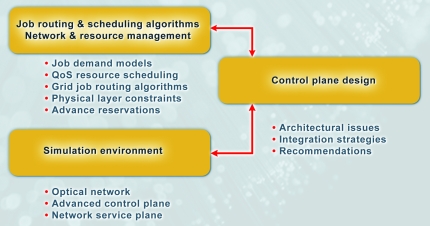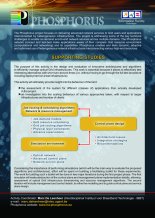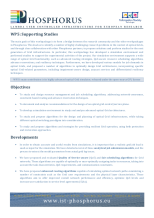Activities
The purpose of this activity is the design and evaluation of innovative architectures and algorithms to efficiently manage optical Grid infrastructures. This work is essential because it allows to effectively test interesting alternatives with short turn-around times (i.e. without having to go through the full test procedure including deployment on a test infrastructure).
This activity will ultimately provide insight into the behaviour of the Grid:
- the assessment of the system for different (classes of) applications than actually developed in the project
- an investigation into the scaling behaviour of various approaches taken, with respect to larger infrastructures and number of clients

Figure 1 - Control plane design schema
Considering the importance of performing simulations (which will be the main way to evaluate the proposed algorithms and architectures), effort will be spent on building a facilitating toolkit for these experiments. The work for building such a toolkit will be done in two major iterations during the first project phase. The first simulator will make abstraction of the control plane and management plane implementation details, allowing assessment of optical Grid infrastructure dimensioning and resource management algorithms. The second iteration will include management and control details, to refine the modelling and to guide control plane and service plane design.
The outcome of this activity area is a set of evaluated algorithms to dimension, manage and control optical Grid infrastructures. Flexibility concerning network architecture, technological choices and load conditions will be included. These results will be vital to objectively evaluate control plane design and management software deployment alternatives.
Major research topics that will be addressed in this activity are presented below.
The focus here is on obtaining realistic Grid traffic at multiple levels (i.e. global, VO, and individual sites). Analysis of this data will provide insight to propose job submission models, which are characterized by, among others, the inter arrival times, processing times and amount of data exchanged.
The design and analysis of routing algorithms is important for any network setting, but the optical Grid environment imposes novel constraints on the problem.
Several causes can be identified:
- Physical impairments (e.g. chromatic and polarization mode dispersion, crosstalk, etc.) emerge because an optical signal experiences physical impairments associated with optical transmission hardware.
- It is important to include the availability of Grid resources and job requirements in the routing protocol, since an optical Grid not only offers data transfer functionality but also processing and storage services.
- Multi-domain issues deal with the heterogeneity of the local networks which compose the Grid environment, which generally causes scalability issues for the control plane.
- Finally, coordination studies will optimize the order and importance of the previous parameters, as to realize general Grid job routing protocols.
The main focus is on the design and evaluation of scheduling algorithms capable of optimal mapping of jobs to resources, considering the job characteristics and QoS requirements.
Three different research tracks will be pursued:
- Design and analysis of resource scheduling algorithms
- Design and analysis of anycast routing algorithms (multicost approach)
- Influence of advance reservations on QoS
Advance reservations are a form of Grid resource management which explicitly includes the time domain. First, a number of information models (i.e. how to represent the necessary information) will be studied, together with policies for admission control. This will lead to the requirements to support different types of advance reservations, such as malleable and deferrable reservations.
- Fundació i2CAT
- Interdisciplinair Instituut voor Breedbandtechnologie
- Research Academic Computer Technology Institute
- Research and Education Society in Information Technologies
- Rheinische Friedrich-Wilhelms-Universität Bonn
- University of Leeds



